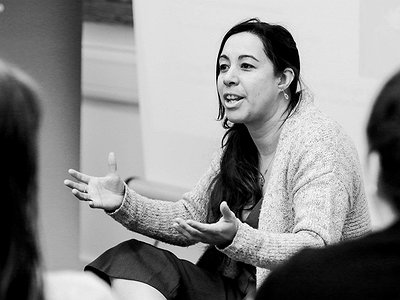Part 1
Name: Naomi Belshaw
Nationality: British
Occupation: PR Executive and PR Manager at WildKat PR
Current Campaigns: Christopher Gunning Concertos album release, the Engengård Quartet, Music@Malling at Home and Shiva Feshareki
Recommendations: Aubrey Beardsley’s drawing plates for Thomas Malory’s Morte d’Arthur and also Oscar Wilde’s play Salomé / The Foundation Trilogy by Isaac Asimov. The premise of the stories is that, in the dying days of a future Galactic Empire, a mathematician called Hari Seldon develops a new theory called psychohistory which uses statistical laws to predict the future of large populations and the universe. It is such an amazing series, especially when you consider it was written before computer technology had really taken off
Website/Contact: Naomi runs her own business consulting with composers at naomibelshaw.com
When did you start out working in music PR - and what or who were your early passions and influences? What what is about music and/or sound that drew you to it?
I started working in music PR just two years ago. I was extremely intrigued by the profession having seen it from other viewpoints in the classical world.
Thus, it was my passion for contemporary classical music and living composers that led me to this role. I was driven by a desire to understand why it is so difficult for audiences to enjoy or naturally consider modern classical music; I wanted to know what role PR played and also what was PR anyway? I have always felt music is an essential primal element in human existence that crosses all boundaries to move people, something I have felt since studying early Christian archaeology in the middle east at university and hearing early Byzantine music
For most, originality is first preceded by a phase of learning and, often, emulating others. What was this like for you? How would you describe your own development as a PR agent and the transition towards your own approach? What is the the relationship between copying, learning and your own creativity?
When I first started at WildKat PR, the company had a great approach in showing you a method for how a typical campaign could be run and I learnt a lot from my co-workers and management. I would call this my early copying phase using methods already tried and tested. As l learnt more from campaign to campaign, I started to understand how important personal contacts were and building greater connections with journalists as well as finding the thing that might in particular catch an individual journalist’s eye. I would say I learnt a lot in this phase experimenting with different things. I gradually built confidence in which approaches worked for me and became more creative. I realise now, I try and judge how different people like to be contacted and try to get to the essence of what is most interesting with each client I work with. I don’t see myself as a PR agent but an advocate for classical music and particularly living composers. I therefore always bring this into everything I do and the conversations I have with journalists who I get to know.
What were your main work-related challenges in the beginning and how have they changed over time?
My greatest challenge at the beginning of working in PR was my writing confidence. I found out late in life after completing a PhD in Archaeology that I was actually dyslexic. This PR role was the first job I took on after a number of years where writing was an integral part of the job and my confidence was very low at the start about whether my success in achieving press was affected by my dyslexia. Over time I have come to realise that my dyslexia does not hold me back and through connections made meeting people, phone calls, events and more I have built on my strengths in connecting with people and my personal confidence in my writing ability has transformed. I have instead found a renewed confidence in my creative writing (which I loved as a teenager) and what my capabilities are, which has been immensely positive.
How do you see the role of music PR in the creative process? What is the scope and what are the limitations of what you are capable of doing?
I find the world of PR and particularly music PR fascinating. Having come from a world of supporting composers at PRS for Music and PRS Foundation, I had never really considered the importance of profile building for a musician and artist’s career and how important public relations is as a profession. While for some artists their profile and career will grow naturally you can’t always leave it to chance, and there are many reasons to recommend contracting a Public Relations company to help sustain or build your career in the right way. PR can help achieve greater audience awareness, future concert opportunities and greater awareness in the industry which could lead to agent, label or publisher deals or other artists and organisations getting in touch for further commissions.
How are the actual music and its presentation it as part of a PR campaign related, would you say?
From my experience, the presentation of music is a huge part of a campaign and in thinking of everything that goes along with a new piece of music performed or recorded. It is an integral part of a campaign to help draw people to listen to the music. The story behind why a particular performance programme has been brought together with the players involved, or the idea behind the album are as important as the music. This is because without a story an audience may not get as far as listening to the music. Also, the use of artwork or music videos can add dimension and build a larger story to align with the music, which can draw both audiences, journalists and critics in. On the flip side, no matter how good the artwork or story behind the music is, if the music is not gripping this will have a definite impact on the PR campaign as well.
Whom do you feel your obligation to – the artists, the journalists you're working with, your own demands in terms of quality?
My obligations are to artists and journalists equally, whilst maintaining quality for them both. A PR’s role is that fine balance between offering the right content for journalists and managing the expectations of the artist. Also working within a media landscape that can change quickly depending on world events and trends, it can be difficult to get press in classical music so one has to be creative. So, in essence, I feel an obligation to everyone.
What are the most important conclusions you've drawn from the changes in the music-, music-PR- and music-journalism landscape? How do they affect music PR in general and your own take on writing in particular? What role do social media play for your approach?
In all the years I have been working in music and also being a consumer myself, I have seen the change in how music is consumed from the advent of the CD, to downloads, MP3 players to streaming, through to the massive growth in festivals and live music. I know that for a time the record industry was struggling, and live music was where artists could make money over recordings available on the Internet and streaming. Yet streaming platforms have now become a key way for newer audiences to find music and playlisting has become an essential promotional tool.
Seeing PR as a way to help build audiences for an artist, it has been important to follow the changes in the way people consume music and decide what music to listen to. Social Media promotes artists well, particularly when linked to online interviews, videos and podcasts. Instagram and YouTube influencers definitely play a role in audience development, though I still feel there is a lot more work to be done in classical music and promotion in this area. It is still the case that traditional TV and Radio and certain classical print /magazines still influence a more traditional classical audience. But when considering reviews and the like, it is definitely the case that space for Classical reviewing and journalism in the national newspapers does shrink year on year. And now what will the effects be for the industry after COVID-19?






